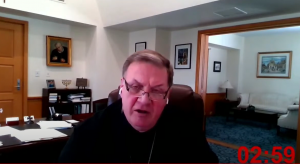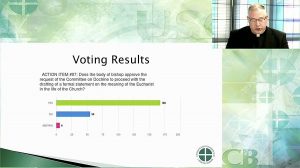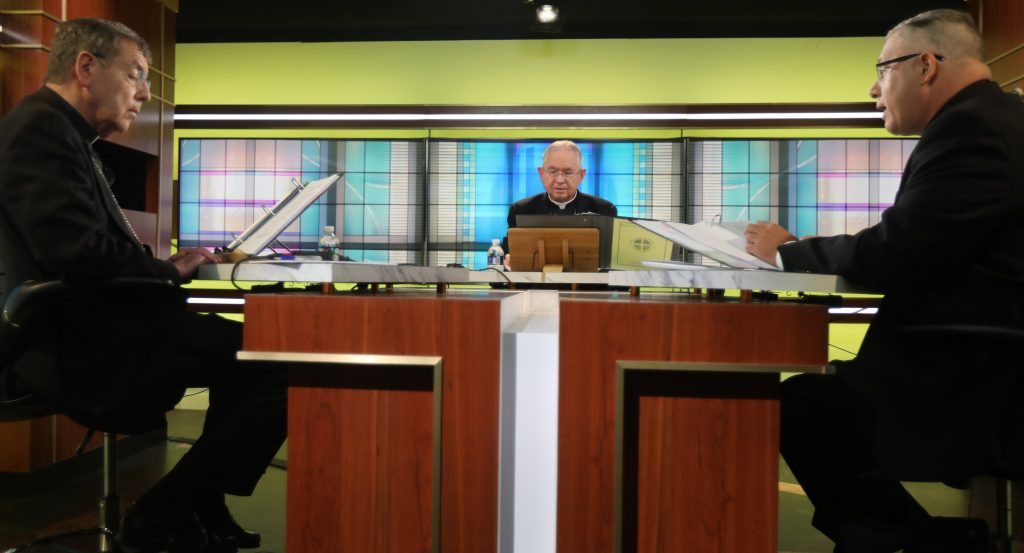The U.S. Conference of Catholic Bishops (USCCB) began its virtual June 16-18 spring plenary assembly in an unusual fashion this year.
Before the body’s president, Archbishop José H. Gomez of Los Angeles, or Pope Francis’ representative in the U.S., Archbishop Christophe Pierre, even had a chance to give their opening addresses via Zoom, the bishops found themselves voting on whether to officially give themselves more time to talk.
They voted not to, but over the next three days they did just that anyway: on each of the meeting’s three days, the bishops went well over their allotted meeting time. On the second day, Archbishop Gomez ceded the floor to more than 40 bishops during an unprecedented three-hour discussion.
The reason for all the talking among bishops was for them to decide whether to begin drafting a document on the meaning of the Eucharist, including the notion of “eucharistic coherence” for Catholic politicians who publicly support legal abortion and other moral evils.
The idea for the document originated from a task force formed by Archbishop Gomez last November to help the bishops navigate the delicate task of dialogue with newly elected President Joe Biden, a practicing Catholic whose policies on abortion rights and other social issues are at odds with Church teaching.
As the debate on whether the bishops’ doctrine committee should move ahead with drafting the document unfolded, a key question emerged: Are the bishops teachers or policymakers?
Although media reports widely portrayed that the bishops were debating whether to deny Communion to President Biden and other pro-abortion Catholic politicians, doctrine committee chair Bishop Kevin Rhoades of Fort Wayne-South Bend, Indiana, said it was never the bishops’ intention to determine a “national policy” on politicians and Communion.
“We’re not talking about a national policy, but a teaching document here,” Archbishop Alexander Sample of Portland, Oregon, agreed in his comments during the debate.
Bishop Rhoades said the bishops are deeply concerned with polls that show many Catholics do not understand the meaning of the Eucharist and that the proposed document was meant to be educational, not disciplinary.
As a body, the conference of bishops has no authority to set policies on who is worthy to receive communion. In a 2004 statement, the U.S. bishops said that such determinations can only be made by individual bishops regarding politicians and public officials in their local dioceses.
“Bishops can legitimately make different judgments on the most prudent course of pastoral action,” according to the statement. “Nevertheless, we all share an unequivocal commitment to protect human life and dignity and to preach the Gospel in difficult times.”

Bishops opposing the drafting of a new document cited a May letter from Cardinal Luis Ladaria, prefect of the Congregation for the Doctrine of the Faith, who warned that any “national policy” on Catholic politicians and the Eucharist could “become a source of discord rather than unity” among the U.S. bishops.
Cardinal Joseph Tobin of Newark, New Jersey, said denying Communion to politicians would “thrust” the bishops “into the very heart of the toxic partisan strife which has distorted our own political culture and crippled meaningful dialogue.”
Such a move, Cardinal Tobin said, “will drive a wedge between the Church and American society as a whole.”
Bishop Robert McElroy of San Diego warned against the “weaponization of the Eucharist in partisan battles.”
Focusing too much on issues like abortion and euthanasia would also “limit the Church’s witness in other areas of moral concern,” such as immigration and the environment, he said.
While bishops opposing the document stressed its possible political consequences, supporters seemed more concerned with the bishops’ responsibility as moral leaders and teachers.
Bishop Donald DeGrood of Sioux Falls, South Dakota, said he had encountered Catholics in his diocese who were “scandalized” by the bishops’ lack of clarity on what the Church teaches on “eucharistic coherence,” an expression that comes from a 2007 Latin American bishops’ document drafted by a commission headed by then-Cardinal Jorge Bergoglio, now Pope Francis.
That document insisted: “We must adhere to ‘eucharistic coherence,’ that is, be conscious that they [legislators, heads of government, and health professionals] cannot receive holy communion and at the same time act with deeds or words against the commandments, particularly when abortion, euthanasia, and other grave crimes against life and the family are encouraged.”
Bishop Donald Hying of Madison, Wisconsin, was one of a few supporters of the document who actually named President Biden.
Biden’s professed Catholicism, while advancing policies strongly contradicting Catholic teaching on abortion and family life, had left faithful “concerned and confused” and looking to the bishops for clear teaching, Bishop Hying said.
Following three hours of debate, nearly three-quarters (73%) of the bishops voted to begin drafting the document.
Although the document was clearly intended to be pastoral, educational, and exhortative, not political or disciplinary, nearly every major commercial media outlet chose to characterize the bishops as moving to censure President Biden and others. “Targeting Biden, Catholic Bishops Advance Controversial Communion Plan,” The New York Times headlined its report.

And in the confusion surrounding the document, some politicians chose to use the moment to challenge the bishops.
More than 60 pro-abortion Catholic Democrats in the House of Representatives issued a “statement of principles,” warning the bishops against “the weaponization of the Eucharist.”
One pro-abortion member of Congress took to social media to say, “Next time I go to church, I dare you to deny me communion.”
The bishops are expected to meet by region in the coming months to generate input for a draft to be discussed and voted on at their next meeting, to be held in person in Baltimore, Nov. 15-18.
The process will surely be marked by more of the intense, apparently fruitful dialogue from last week’s meeting. But it will also come with some challenges. Among these challenges will be trying to avoid direct confrontation with President Biden and other pro-abortion Catholics, without sounding too vague.
Timing will also be a concern. Is there enough calendar space in the five months for the bishops to get together and come up with things to say in the document? Given the pace at which the bishops’ conferences processes normally move, and the unpredictability of the relevant policy battles that might break out in Washington, D.C., this year, who can say?
But the biggest challenge may be coming to a shared understanding of what a bishop is supposed to say and do in 2021 America.
Judging by their remarks this week, bishops opposed to a document on the Eucharist seem to fear that it will hamper the bishops’ conferences’ efforts to advocate for social justice and those “on the peripheries” of society. Those favoring the new document seem to fear that if the bishops fail to lead and teach strongly, they will lose their credibility with the faithful as well as their moral authority in society.
In their remarks, both Archbishop Gomez and Archbishop Pierre identified unity as the bishops’ most pressing need in 2021. After their latest Zoom meeting, it is clear that the bishops will need all the talking time they can get in the next five months if they want any chance of finding it.

